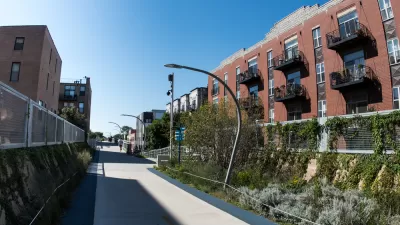The Guardian published an in-depth exposé of the causes and effects of gentrification in the city of Atlanta.

While much of the attention for skyrocketing housing prices gets focused on cities like San Francisco or New York City, the city of Atlanta flies under the radar despite housing prices rising much faster than the national average.
Jamiles Lartey writes:
Gentrification is affecting cities around the world, but housing advocates say there’s something especially unsettling about racial dynamics of those forces in Atlanta, a city historically described as a “black mecca”.
While median rents are up 28 percent since 2000 (9 percent is the national average), so too is the population of whites in the city. Lartey explains the nuances of that latter point:
According to the Brookings Institution demographer William Frey, the proportion of white people in Atlanta’s population grew faster between 2000 and 2006 than in any other US city. While it is true that over the past 20 years there has been a steady flow of black Americans to the Atlanta region, they’ve mostly settled in suburbs to the north – leaving the city center itself disproportionately attracting white Americans.
To drive home the effect of these changes on the traditionally black neighborhoods located in the city, Lartey selects the Old Fourth Ward neighborhood, where Martin Luther King Jr. grew up, as a case study, among other neighborhoods.
In a particularly provocative choice, Lrtey places much of the blame for Atlanta's demographic changes on the Atlanta Beltline:
As the city draws more transplants thanks to booming business in industries such as financial technology and film, the promise of nearby leisure space and easy transit has driven development and soaring prices along the BeltLine’s perimeter. A 2017 Georgia State University study found that home values within a half-mile of the BeltLine rose 17.9% to 26.6% more than locations in other parts of the city between 2011 and 2015.
Finally the article examines the city's history as the first to complete construction of a public housing project, back in 1936, and the ravages of the subprime lending crisis on 2008 and beyond.
FULL STORY: Nowhere for people to go: who will survive the gentrification of Atlanta?

Planetizen Federal Action Tracker
A weekly monitor of how Trump’s orders and actions are impacting planners and planning in America.

The Simple Legislative Tool Transforming Vacant Downtowns
In California, Michigan and Georgia, an easy win is bringing dollars — and delight — back to city centers.

San Francisco's School District Spent $105M To Build Affordable Housing for Teachers — And That's Just the Beginning
SFUSD joins a growing list of school districts using their land holdings to address housing affordability challenges faced by their own employees.

In More Metros Than You’d Think, Suburbs are Now More Expensive Than the City
If you're moving to the burbs to save on square footage, data shows you should think again.

The States Losing Rural Delivery Rooms at an Alarming Pace
In some states, as few as 9% of rural hospitals still deliver babies. As a result, rising pre-term births, no adequate pre-term care and "harrowing" close calls are a growing reality.

The Small South Asian Republic Going all in on EVs
Thanks to one simple policy change less than five years ago, 65% of new cars in this Himalayan country are now electric.
Urban Design for Planners 1: Software Tools
This six-course series explores essential urban design concepts using open source software and equips planners with the tools they need to participate fully in the urban design process.
Planning for Universal Design
Learn the tools for implementing Universal Design in planning regulations.
Smith Gee Studio
City of Charlotte
City of Camden Redevelopment Agency
City of Astoria
Transportation Research & Education Center (TREC) at Portland State University
US High Speed Rail Association
City of Camden Redevelopment Agency
Municipality of Princeton (NJ)





























